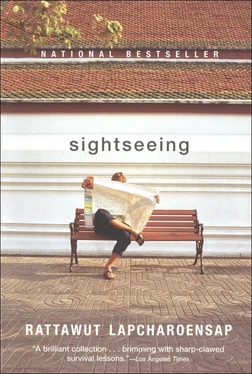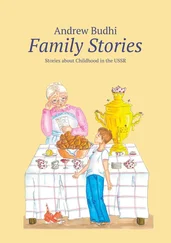Wichu’s mother has arrived. She gestures to Wichu. Wichu walks over to her. She’s wearing her housecleaning uniform. She waves at me, smiles, and I return the courtesy. I watch Wichu kiss her on the cheek, watch her fuss over his hair and his shirt again. She’s brought us lunch, and Wichu carries the canteen back to our seats. As we eat, Wichu asks me if my parents are coming. I tell him no. I tell him that my parents are too nervous; I tell him they can’t bear to watch. The truth, of course, is that my parents have gone to Chatuchak to buy birds-of-paradise for my mother’s garden. Wichu nods. The lunch his mother has prepared — pork fried rice and green eggplant curry — tastes bitter and metallic in my mouth. But I am famished and devour it anyway. All the other boys are eating as well. Soon, the air is a potent admixture of home-cooked dishes. The sparrows in the rafters flutter down to peck at food spilled on the pavilion floor.
After we finish eating, Wichu and I share a jasmine tea. As I’m taking a swig, an officer — a balding, middle-aged man with a gut like a melon and a toothpick between his teeth — taps me on the shoulder. He smells strongly of whiskey and nicotine and cologne. A dark map of sweat soaks his shirtfront.
He asks me if I am who I am. I nod. He asks me to come with him. Wichu looks panicked. He asks the officer if there’s a problem, but the officer just adjusts his toothpick, moves it to the other side of his mouth, and says:
No problem, son. Nothing to worry about. Your friend’s in good hands.
I do not look at Wichu as the officer talks. When I get up to follow the officer, Wichu taps me on the forearm. He smiles and asks me if I’ll be okay. I pause for a moment, standing, peering down into my friend’s face, not quite understanding his question.
I realize then that Wichu knows. Of course he knows. He was here, at this temple, outside of the pavilion with his mother, when Khamron got drafted years ago. He was here when the wealthier boys got taken out of the line. He was here when those same boys came back an hour later, took their places at the end of the lottery line, and — when their turns came — drew black card after black card after black card. Wichu had told me all about it the night of his brother’s draft. Although I had only half listened to him at the time, the memory of his voice comes back to me now in all its anger.
Hey, he says again, still smiling. You gonna be okay?
I understand then that he’s not really asking about my well-being. He’s asking for penitence. He’s asking for an explanation. He’s asking me why I didn’t tell him beforehand. The officer clears his throat impatiently beside me. I muster a smile, though I feel nauseated. I tell Wichu to save me my place in line.
I follow the officer out of the pavilion, across the temple grounds toward the monks’ quarters. I walk head down, try not to look at the relatives when I walk past, though I feel all their eyes on my back. The officer offers me a cigarette. Though I desperately want one I tell him that I do not smoke. When we arrive at the monks’ quarters, there’s a small crowd of boys sitting there, smiling and laughing and talking exuberantly. I take my place among them. Years later I will wonder if I could’ve said something to the officer, told him Wichu’s name. But that draft day morning I just sit down on the teakwood floor, filled with relief even as I feel dizzy with dread, thinking of Wichu’s smiling face, of him asking me, his voice a frightening monotone, if I was going to be okay.
The lottery begins. All the boys in the monks’ quarters fall silent. We listen to a booming voice in the pavilion announce each boy’s name one by one over the speakers, followed by the color of the ticket drawn. Sorachai Srijamnong: Red. Kawin Buasap: Red. Surin Na Nakhon: Black. Worawut Chaiyaprasoet: Red. The crowd is silent with every red, uproarious with each black. I listen for Wichu’s name. I look at the other boys; I wonder if they, too, are listening for their friends’ names out in the pavilion.
The officer who escorted me earlier appears. He tells us to go back and seat ourselves at the end of the lottery line. Some of the boys get nervous. They ask him why. This isn’t what we’d agreed, says one of the boys. Why don’t you send us home already. But the officer tells us not to worry. You pansies, he says, grinning. Relax. Nothing’s gonna happen to daddy’s little boys.
So we return to the pavilion, walk back single file across the temple ground. When we take our seats at the end of the lottery line, the other boys turn around to look. Word has already spread about us, about the boys who’d been taken out of the line before the end of the lunch hour. I hear relatives on the sidelines hissing and murmuring among themselves.
Fucking corruption, somebody says.
Cowards, says another.
Just another day in the Kingdom of Thailand.
I see the back of Wichu’s head some twenty meters ahead, the only thing I recognize in that sea of black and brown before me. He has not turned around to look at our entrance. He’s staring into his hands, leaning on his knees.
I see his mother, though. I do not want to meet her eyes, but it is already too late. We look at each other and when we do, I feel my cheeks flush. She nods at me once and then she turns back to look at the boy onstage. She will not look at me again for the rest of the day.
The boy onstage wraps his fingers around the amulet dangling from his neck with one hand, reaches into the lottery urn with the other. Red . A moan comes from a section in the crowd. The boy walks off looking stunned, drags his feet across the stage, while the speaker announces another name.
You’re all right, boy, a man yells from the sidelines. The boy ignores him. You’re all right, the man says again.
The new draftees are being sent to the pagoda, where officers wait for them with scissors and shears. They get their hair cut standing up, small towels draped around their necks like scarves. A few temple novices sweep the piles of hair around their feet. Soon, there’s a crowd of young men watching the lottery outside the pavilion shade, their scalps shiny under the afternoon sun. Nice haircut, I hear somebody say to a boy who’s been drafted.
Around four, Kitty walks onstage. There’s laughing and clapping again, but this time Kitty just fingers the hem of his blouse. Krittaphong Turapradit, the speaker system announces, and I realize that I haven’t heard Kitty’s real name in a very long time. Even from where I am sitting, I can see beads of sweat glistening on Kitty’s forehead. I see Wichu sit up straight to watch. Kitty retrieves a handkerchief from his purse to wipe away the sweat. The crowd quiets down while the officer spins the lottery urn; the mechanism’s creaking echoes through the pavilion. Kitty reaches into the urn with his eyes shut and pulls out a card. He hands it to the officer. Black. The crowd cheers, though there are also a few groans of sadistic disappointment.
Kitty leaps up and down like a jubilant child, his red blouse flapping wildly against his torso. When an officer tries to escort Kitty off the stage, he faints and collapses to the floor, like somebody has reached down and yanked the spine from his back, and there is laughter all around as the officers try to revive him.
The names march on, reds interrupted every so often by a few blacks. It is almost Wichu’s turn now. I see his mother chewing her nails to the quick. She waves at Wichu every so often, but Wichu just keeps on staring into his hands.
The boys around me are nervous. I don’t get it, one of them says. No way in hell they’re making me get up there. Our fathers already gave them what they wanted, right? The other boys tell him to shut up. It’ll work out, one of them says. I’m sure they’ll send us home soon.
Читать дальше











